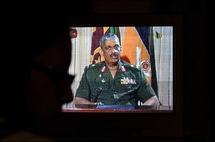Sri Lankan troops seize last Tiger town
Amal Jayasinghe
COLOMBO (AFP) - Sri Lankan troops on Sunday overran the last town controlled by Tamil rebels, army chief Lieutenant General Sarath Fonseka said, striking a major blow in Asia's longest-running ethnic conflict.
"We have completely captured Mullaittivu," the army chief said in a televised address to the nation.
The fall of the urban stronghold is a huge loss to the Tigers, who are now said to be confined to a small swathe of coastal jungle north of Mullaittivu.

"We have cleared 95 percent of the work (to defeat the Tigers)," Fonseka said. "The end of terrorism is near and we will definitely win. The Tiger garrison of Mullaittivu was destroyed today."
He said troops took a year to fight their way through 40 kilometres (25 miles) of thick jungle and had to scramble over earth barriers erected by the Tigers, in their drawn-out offensive to take Mullaittivu.
"The Tigers are now confined to a small strip of between 20 kilometres by 15 kilometres," he said, adding that 150,000 civilians were still being held hostage by the rebels.
The defence ministry said retaking Mullaittivu after 12 years was a major landmark in the military's attempt to defeat the separatist Tamil Tigers, who launched their campaign in 1972.
"Today's recapture of Mullaittivu town by army troops marks a significant victory over terrorists," the ministry said. "This victory is definitely a tremendous morale booster and a milestone."
A visiting Japanese envoy, Yasushi Akashi, on Sunday expressed fears for civilians and said the Tigers should allow them to reach safety, urging the government to send more relief supplies.
Government officials said public offices in Mullaittivu had closed at the weekend and public servants had moved away from the city centre ahead of the military advance on Sunday.
Civilians had also moved further north into the jungle areas where the guerrillas had retreated.
Sri Lanka's government paid the salaries of public servants who worked in areas held by the Tigers.
Earlier in the day, small groups of special forces backed by 50,000 soldiers and helicopter gunships entered the town of Mullaittivu amid heavy rebel resistance.
The advance was the latest in a series of successes for the government in a massive military assault aimed at ending the separatist conflict led by the Liberation Tigers of Tamil Eelam (LTTE).
Troops in small groups used boats to enter the western side of Mullaittivu, a military official told AFP on condition of anonymity.
The Tigers had blown up a dam and flooded surrounding areas on Saturday in a bid to stall the military's progress.
After retaking the rebels' main city of Kilinochchi earlier this month, the army vowed to capture rebel leader Velupillai Prabhakaran, whose whereabouts are unknown.
Army chief Fonseka said last week that he believed Prabhakaran may have already fled the country by boat.
Neighbouring India as well as Malaysia said they had stepped up efforts to prevent Prabhakaran entering their territories.
Sri Lankan President Mahinda Rajapakse said in a New Year's address that 2009 would be the year of "heroic victory" over the Tigers, who have been waging war for almost four decades to establish an independent homeland for ethnic Tamils.
Tens of thousands of people have been killed since the conflict began but Rajapakse's government pulled out of an on-off ceasefire last year and launched a fresh campaign to crush the Tigers once and for all.
The Tigers have not commented on the latest fighting, but Prabhakaran said last year that he would fight on. The group became known for their trademark suicide bombings.
Human rights groups have criticised the Tigers for forcing children to fight as soldiers, and the LTTE has been labelled a terrorist group by the United States, the European Union and neighbouring India.
----------------------------------------
Image of a Sri Lankan woman watching a televised announcement in which army chief Lieutenant General Sarath Fonseka said Sri Lankan troops had overrun the last town controlled by Tamil rebels, striking a significant blow in Asia's longest-running ethnic conflict; by Lakruwan Wanniarachchi.